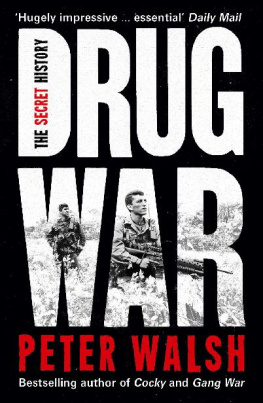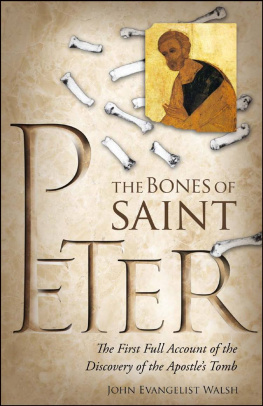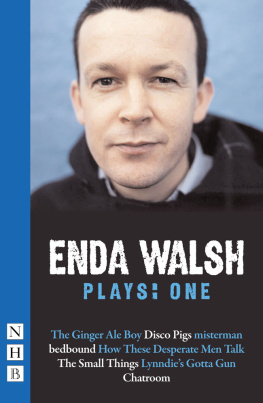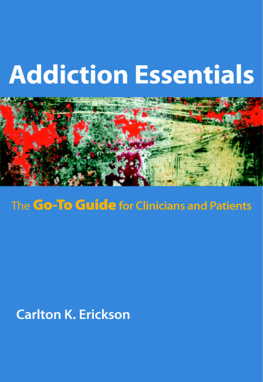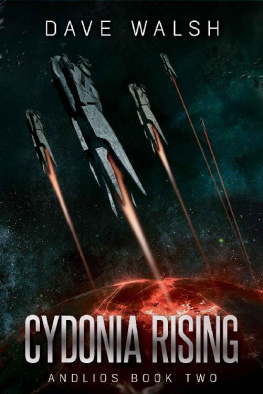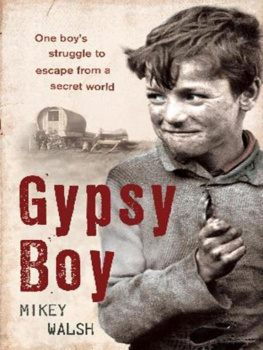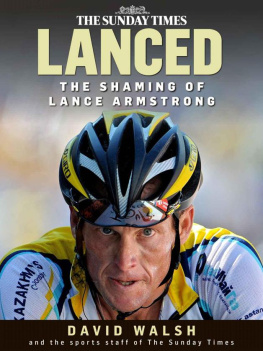DRUG WAR
The Secret History
Peter Walsh
Milo Books
Published in October 2018 by Milo Books
Copyright Peter Walsh 2018
The moral right of the author has been asserted.
All rights reserved. Without limiting the right under copyright reserved above, no part of this publication may be reproduced, stored in or introduced into a retrieval system, or transmitted, in any form or by any means (electronic, mechanical, photocopying, recording or otherwise) without the prior written permission of both the copyright owner and the above publisher of this book.
www.milobooks.com
HM Customs and Excise have primary responsibility for preventing and detecting the illegal import and export of controlled drugs, the investigation of organisations and individuals engaged in international drugs smuggling, their prosecution and the identification of any proceeds of such crime.
Tackling Drugs Together ,
UK GOVERNMENT WHITE PAPER, 10 MAY 1995
Contents
Acknowledgements
To undertake a modern history of drug trafficking, in which much of the action takes place clandestinely, is a prospect both exciting and daunting. Official secrecy and the guarded nature of law enforcement are compounded by the hazards of seeking information in an arena in which few of the protagonists want publicity and some actively discourage it. Once those barriers are overcome, however, a wealth of fascinating material lies waiting.
This book is based largely on a unique series of interviews, conducted mainly face-to-face (some by email or telephone) over a six-year period, with approximately sixty former investigators of Her Majestys Customs and Excise (HMCE). Most agreed to talk not for self-aggrandisement but to provide a lasting record of the memorable things they did, before their recollections are lost. They told stories of their most wily, elusive and dangerous targets, their most significant cases, their collaborations and conflicts with other agencies, their ground-breaking experiences abroad, and their strong camaraderie. With the distance of time most left the organisation well over a decade ago they were able to speak with the confidence that they would not inadvertently jeopardise any potential or ongoing investigations, nor disclose any of the more recent intrusive techniques. Their memories provide an invaluable record of an extraordinary period in British law enforcement and of a unique group of men and women. They are supplemented by around forty other interviews and a long period of background research among archives, court documents, academic papers, newspapers, magazines and books.
I am indebted to three former investigators in particular. Graham Honey opened doors to others, phoned frequently to check progress and offered enlightening, often amusing views on his former service. John Cooney, whose work in investigation covered almost the entire period under study and whose background knowledge regarding many of its aspects is probably unsurpassed, was extremely helpful in many ways. Given his nature I suspect he will dislike being mentioned, but I feel compelled to acknowledge his thoughtful contribution and support. Above all, David Raynes helped to make this book possible. He introduced me to numerous former colleagues and was a constant sounding board. His scepticism when first told of what I planned to write was not misplaced; it has taken far longer and been far harder than I anticipated. It has also been an endlessly compelling journey, and it is no exaggeration to say that without Davids huge assistance I would not have left the starting gate. He holds strong opinions and Im sure will find things herein to disagree with. It goes without saying that any judgements, interpretations and conclusions drawn from the evidence and testimony I have amassed are mine alone.
Many other former HMCE staff freely gave up hours of their time and often welcomed me into their homes. I can vouch for their generosity, impressive coffee-making skills, and capacity to still knock back a glass or two when the occasion requires. Candour, self-deprecation, dry wit and obvious pride in their former cohort were almost universal traits. I would like to express deep gratitude to, in alphabetical order, Paul Acda, Peter Alexander, George Atkinson, Nick Baker, Paul Bamford, John Barker, Jim Barnard, Graham Bertie, Derek Bradon, Phil Byrne, Terry Byrne, Chris Caton, Geoff Chalder, Steve Coates, Mike Comer, Phil Connelly, John Cooney, Brian Corbett, the DLO, Hugh Donagher, Martin Dubbey, Brian Ellis, Robin Eynon, David Evans, Mike Fletcher, Jim Galloway, Gary, Mike Gough-Cooper, Colin Gurton, Barry Gyseman, Chris Hardwick, Chris Harrison, Dave Hewer, Alan Huish, Jim Jarvie, Mike Knox, Theresa Lee, Tony Lester, Tony Lovell, Allan McDonagh, Pete McGee, Tommy McKeown, Geoff Newman, Mike Newsom, John Pearce, Ray Pettit, Peter Robinson, Ron Sanders, Ron Smith, Mark Sprawson, Bill Stenson, Emrys Tippett, Doug Tweddle, Cameron Walker and Peter Walker. Sadly during the prolonged period of my research and writing, five other interviewees passed away before completion of this project: Brian Clark, John Hector, Tim Manhire, Richard Lawrence and Andy Young. Five more different personalities it would be hard to meet, a reflection of the broad church that was the Investigation Division, but all were impressive figures.
One sensitive area was the discussion of communications interception, a vital part of high-level anti-drugs work but one historically cloaked in secrecy. Greater official openness in recent years has, to a degree, brought telephone tapping out of the shadows a recent book on the subject by a former officer was turned into a shortlived television drama but even long-retired investigators were prepared to describe the practice only in general terms, rather than refer to its use in any specific case or operation. Otherwise they spoke with frankness. There were occasions when parts of interviews were granted only on a non-attributable basis, and others where I have chosen to anonymise contributors for various reasons, but all direct quotes in the book can be sourced. Fewer than half a dozen people requested blanket anonymity. Even fewer rejected a request for interview outright. Regrettably one of the latter was Paul Evans, the chief investigation officer at a particularly momentous, and fateful, time for the organisation, who politely declined several approaches.
Drugs investigation in the UK was principally the concern of two separate organisations: the police and HMCE. There is a danger when a book is based on so many sources from one particular service that it may be skewed to their perspective, perhaps unfairly. I chose to concentrate on HMCE for three reasons. Firstly, they were the agency primarily responsible for stopping illegal importation, the main theme of this book. Secondly, there are already numerous autobiographies by former police officers and accounts of various aspects of their service, but very few by customs investigators or about their specialist anti-drugs teams. Thirdly, to cover police work, which involved combating the internal distribution and sale of drugs throughout the country as well as some importation cases, would have been too much for a single volume. I have tried to be an impartial witness to the long-lasting rivalry between some parts of the police service and their civil service counterparts, and have always tried to verify personal anecdotes by cross-referring with other sources. I also benefited from the generous contributions of former detectives Peter Bleksley, Brian Flood, Mick Foster and Paul Harris.
One-time drug traffickers are not the easiest people to find, never mind to interview. I am very grateful for the candid contributions of Nick Brewer, Steve Brown, Damien Enright, Marc Fievet, the late Howard Marks, Francis Morland and Maurice OConnor, and others I promised not to name. From the legal profession I would like to thank Crown advocates Shane Collery and Robert Davies for their help. Journalists Glen Campbell, Richard Elias, Jonathan Foster, Adrian Gatton, Gillian Gray, Graham Johnson, Hendrik Jan Korterink, Paul Lashmar, John Mooney, James Oliver and Tony Thompson shared information, documentation and photographs. US Customs agent Nigel Brooks offered invaluable insight into the multinational Operation JezebelJourney, and from the FBI Manny Ortega was also helpful. Rein Gerritsen, Jeanette Groenendaal, Barbara Linick and Nick Halls provided background on certain key characters, and Dr Malcolm Murfett, of Kings College, London, made valuable comments on parts of the early manuscript. I would also like to thank Penny Tait, daughter of the late Sam Charles, for her warm hospitality, homemade damson gin, and memories and photographs of her remarkable father. The excellent staff at the National Archives, in Kew, deserve special mention, as does the UK Border Force National Museum, Liverpool.

